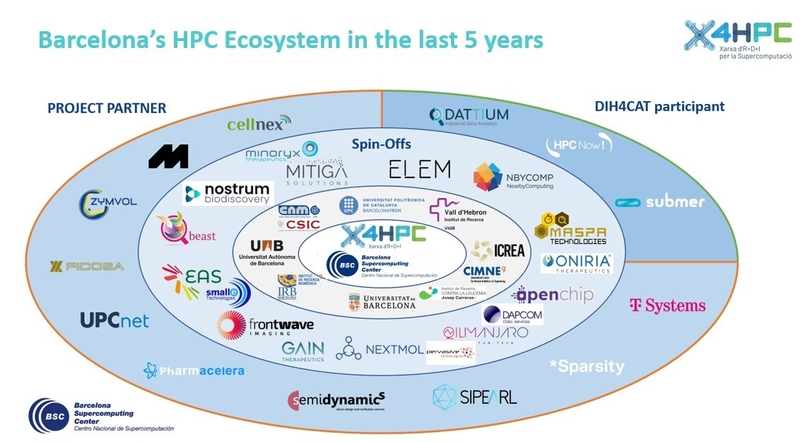The Barcelona Supercomputing Center-Centro Nacional de Supercomputación (BSC-CNS) coordinates the Catalan Supercomputing Network (X4HPC), which aims to provide the Catalan supercomputing ecosystem with mechanisms for technology transfer and knowledge valorisation. It gathers 23 research groups from 8 leading Catalan institutions that work in the field of Supercomputing, such as the Universitat de Barcelona (UB), the Universitat Autònoma de Barcelona (UAB), the Vall Hebron Research Institute (VHIR), the Barcelona Biomedical Research Institute (IRB), the Josep Carreras Leukemia Research Institute (IJC), the National Center for Microelectronics (CNM-CSIC) and the International Center for Numerical Methods (CIMNE).
The X4HPC Network's mission is to accelerate the valorization and technology transfer of scientific projects that use Supercomputing tools, supporting disruptive technologies that generate a positive social and economic impact and fostering entrepreneurship and the creation of Spinoffs. As well as promoting the interaction between research and Industry (through open innovation initiatives). With the vision of turning the X4HPC into an innovation pool in HPC technologies at an international level.
The X4HPC Network, through its tech transfer mechanisms, wants to have a positive impact on the Catalan research and innovation system, stimulating the generation of new groups and research projects that develop innovative solutions focused on: offering technological sovereignty in the design of more energetically efficient processors, solutions that apply supercomputing to face the challenges of climate change, precision medicine or the simulation of complex phenomena in the field of engineering. High-performance computing and its applications in frontier scientific fields (design of new processors, AI, quantum supercomputing among others) will have a clear dynamizing effect on the ecosystem of Technological Based Companies (TBCs) and companies in mature sectors, since these companies can become tractors of the technologies developed from the research centers.
As a result of the tasks carried out by the X4HPC Network during the next 3 years, the Network intends to grow and revitalize the ecosystem of research agents, institutions, companies and TBCs that consider High-Performance Computing (HPC) as the main axis of their scientific activity or their value propositions.
This new Network is currently composed of more than 250 researchers from 23 research groups and 8 different institutions (UB, UAB, VHIR, IRB, IJC, CNM-CSIC y CIMNE). It is coordinated by the Barcelona Supercomputing Center (BSC-CNS) and is funded by the Departament de Recerca i Universitats of the Generalitat de Catalunya, through the Agència de Gestió d’Ajuts Universitaris i de Recerca (AGAUR).
The Catalan HPC Ecosystem
Over the last five years, the HPC ecosystem in Catalonia has grown exponentially, and it does not plan to stop growing. Many institutions located in Catalonia find themselves at the core of an ever more consolidated ecosystem that turns around High-Performance Computing (HPC) tools and their different scientific applications in a myriad of relevant fields.
Pursuing close collaborations with companies and research partners in many scientific projects of strategic value is the key in the HPC field. Only at the BSC, of the recurrent collaborating companies in scientific and transfer projects, 24 are Technology-Based Corporations (TBCs), working with HPC technologies and operating directly from Catalonia. Of those, 11 are BSC Spin-off companies, whose creation included partnering with a myriad of neighbouring scientific institutions such as UPC, ICREA, IRB, UB, UAB, CNM-CISC, VHIR, IJC, CIMNE, IFAE, and other international scientific entities. Those companies are creating more than 120 job positions and have attracted more than 6 million Euros in funding.
However, even though the numbers are impressive, the growth ratio in an ecosystem of this size might not be as high as one would like it to be when compared with other institutions nationally or internationally. Many barriers to the technology getting closer to market relate to the lack of funding resources allocated to the process of technology valorization and transfer. Those cause severe losses in terms of opportunity –given the high-speed pace of the deep tech transfer environment around HPC technologies in Catalonia.




